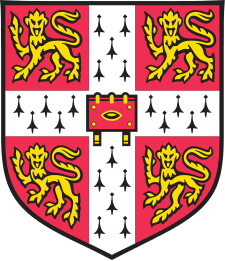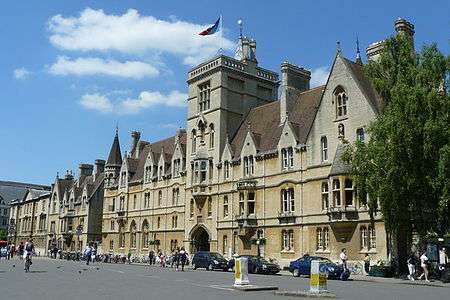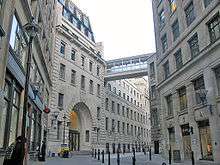Golden triangle (universities)

The "golden triangle" is an unofficial grouping of elite universities located in the English cities of Cambridge, London and Oxford,[1] as listed below:[8]
- University of Cambridge
- Imperial College London
- King's College London[note 1]
- London School of Economics[note 2]
- University College London
- University of Oxford
The corners of the triangle are formed by the University of Cambridge, the University of Oxford and, to the south-east, Imperial College London, University College London and typically King's College London and London School of Economics and Political Science.[18] The members of the triangle have among the highest research incomes of all British universities and collaborate closely through initiatives such as the G5,[19] Global Medical Cluster (GMEC),[20][21] MedCity,[22] and SES.[23] The term, originally coined to describe a group of universities with a large research income, is now also used as a short-hand for the members' perceived prestige and reputation.[24]
Members
Golden triangle universities possess some of the largest UK university financial endowments, allowing the universities sufficient resources in delivering their academic programmes as well as research initiatives. As of 2014, University of Cambridge has an endowment of £5.89 billion.[25] Further, each university receives millions of pounds in research fundings and other grants from the UK government, a detail not unnoticed by other leading universities.[26]
| Institution | Arms | Location | Undergraduate enrollment | Graduate enrollment | Total enrollment | 2015 Endowment | Academic staff | Colors | Motto | ||||||||||||||||||||||
|---|---|---|---|---|---|---|---|---|---|---|---|---|---|---|---|---|---|---|---|---|---|---|---|---|---|---|---|---|---|---|---|
| University of Cambridge |  |
Cambridge, Cambridgeshire |
12,230 (2014/15)[27] | 7,285 (2014/15)[27] | 19,515 (2014/15)[27] | £5.9 billion (including colleges)[25] | 6,645[28] | Cambridge Blue[29] |
Hinc lucem et pocula sacra (From this place, we gain enlightenment and precious knowledge) | ||||||||||||||||||||||
| Imperial College London |  |
London, Greater London |
9,015 (2014/15)[27] | 7,595 (2014/15)[27] | 16,610 (2014/15)[27] | £113.6 million[30] | 3,692[30] | |
Scientia imperii decus et tutamen (Knowledge is the adornment and protection of the Empire) | ||||||||||||||||||||||
| King's College London |  |
London, Greater London |
17,610 (2014/15)[27] | 11,120 (2014/15)[27] | 28,730 (2014/15)[27] | £179.4 million[31] | 4,520[32] | Blue & King's Red [33] |
Sancte et Sapienter (With Holiness and Wisdom) | ||||||||||||||||||||||
| London School of Economics |  |
London, Greater London |
4,415 (2014/15)[27] | 6,185 (2014/15)[27] | 10,600 (2014/15)[27] | £112.9 million[34] | 1,303 | Purple, black and gold[35] |
Rerum cognoscere causas (To Know the Causes of Things) | ||||||||||||||||||||||
| University College London | N/A | London, Greater London |
16,830 (2014/15)[27] | 18,785 (2014/15) | 35,615 (2014/15)[27] | £103.6 million[36] | 7,070[32] | Cuncti adsint meritaeque expectent praemia palmae (Let all come who by merit deserve the most reward) | |||||||||||||||||||||||
| University of Oxford |  |
Oxford, Oxfordshire |
11,703 (2014/15)[37] | 10,173 (2014/15)[37] | 22,348 (2014/15)[37] | £4.8 billion (including colleges)[38] | 3,700 | Oxford blue[39] |
Dominus Illuminatio Mea (The Lord is my Light) |
Rankings
World
| University | THE World (2015/16)[40] | QS World (2015/16)[41] | ARWU World (2016)[42] | US News Global (2014/15)[43] | Global Employability Ranking (2015)[44] |
|---|---|---|---|---|---|
| Imperial College London | 8 | 8 | 22 | 12 | 15 |
| King's College London | 27 | 19 | 50 | 61 | 43 |
| London School of Economics[45] | 23 | 35 | 101-150 | 328 | 45 |
| University College London | 14 | 7 | 17 | 21 | 30 |
| University of Cambridge | 4 | 3 | 4 | 6 | 2 |
| University of Oxford | 1 | 6 | 7 | 5 | 3 |
National
| University | THE Table of Tables (2016)[46] | Complete (2017)[47] | Guardian (2016)[48] | The Times (2016)[49] | UK Employability (2015)[50] |
|---|---|---|---|---|---|
| Imperial College London | 4 | 4 | 8 | 3 | 3 |
| King's College London | 29 | 21 | 36 | 27 | 5 |
| London School of Economics | 8 | 3 | 13 | 9 | 6 |
| University College London | 12 | 10 | 12 | 10 | 8 |
| University of Cambridge | 1 | 1 | 1 | 1 | 2 |
| University of Oxford | 2 | 2 | 2 | 2 | 1 |
Research income
| Rank | University | Research income (£,000) |
| 1 | University of Oxford | 522,900 |
| 2 | Imperial College London | 427,700 |
| 3 | University College London | 427,500 |
| 4 | University of Cambridge | 397,000 |
| 7 | King's College London | 210,800 |
| 43 | London School of Economics | 27,100 |
Gallery
| Golden Triangle (Universities) | ||||||||||||
|---|---|---|---|---|---|---|---|---|---|---|---|---|
|
See also
- Research-intensive cluster
- G5
- SES-5 - Formal grouping of universities in the South East
- Global Medical Excellence Cluster
- Ivy League
- MedCity (London)
- Russell Group
Notes
References
- ↑ Multiple sources state the golden triangle is formed around Oxford, Cambridge and London[2][3][4][5][6][7]
- ↑ "Oxbridge windfall". Times Higher Education. 4 August 1995.
A large amount of the cash awarded to humanities postgraduates still goes to the "Golden Triangle" of Oxford, Cambridge and London, British Academy figures reveal.
- ↑ Kershaw, Alison (4 October 2012). "UK universities slip in rankings". The Independent.
Rankings editor Phil Baty said: "Outside the golden triangle of London, Oxford and Cambridge, England's world-class universities face a collapse into global mediocrity.
- ↑ Andrew Ward (25 June 2015). "Johnson floats £10bn biotech fund for London". Financial Times.
MedCity was launched last year to increase collaboration between Imperial College, King's College and University College London — the capital's three main science universities — and promote the broader 'golden triangle' between London, Cambridge and Oxford to investors.
- ↑ Rebecca Marriage (11 March 2015). "UK confirmed as 'global education superpower' in international university rankings". ReLocate Global.
The 'golden triangle' of Oxford, Cambridge and London strengthened its grip on UK higher education: As well as Cambridge and Oxford rising closer to the summit, University College London moved up from 25th to 17th, the London School of Economics rose two places to 22nd and King's College London jumped eight places from 43rd to 31st.
- ↑ Mullins, Justin (23 April 2005). "England's golden triangle". New Scientist.
Take a look at any of the various league tables ranking universities around the world ... Oxford and Cambridge are in the top handful, while London's University College and Imperial College sit comfortably in the top 25. ... London, Oxford and Cambridge are a 'golden triangle' of academic success.
- ↑ Wiggins, Kaye (11 March 2015). "The World Reputation Rankings: UK's university 'golden triangle' strengthens grip".
The “golden triangle” of Oxford, Cambridge and London has strengthened its grip on the UK’s higher education system, according to the latest global reputation rankings from TES’s sister title Times Higher Education.
- ↑ Multiple sources confirm the membership, although some omit either King's or LSE, as noted under their entries[9][10][11][12][13][14][15][16][17]
- 1 2 "Golden opportunities". Nature. 6 July 2005.
No longer rivals, Oxford, Cambridge and London are now working towards a common goal — ensuring the 'golden triangle' becomes a global science hub.
(Names Oxford, Cambridge, UCL, King's and Imperial) - 1 2 Zoe Corbyn (26 November 2009). "In research, small is just as beautiful". Times Higher Education.
The findings reveal the full extent of the dominance of the golden triangle: papers from the universities of Oxford, Cambridge, University College London, Imperial College London, and the London School of Economics were cited far more often than the world average
(Names Oxford, Cambridge, UCL, Imperial and LSE) - 1 2 "'Golden triangle' to win funding riches". Times Higher Education. 11 February 2010.
The other institutions in the Cambridge-Oxford-London 'golden triangle' - University College London, Imperial College London and the London School of Economics - will also receive big cash windfalls, as will the University of Manchester.
(names Oxford, Cambridge, UCL, Imperial and LSE) - ↑ Sean Coughlan (3 October 2013). "London top city in global university rankings". BBC News.
The so-called 'golden triangle' of UK universities - Oxford, Cambridge and leading London institutions - is seen as a breakaway elite group, with these universities consolidating their international reputations. Imperial College, University College London, LSE and King's College London are all in the top 40.
(Names Oxford, Cambridge, UCL, King's, Imperial and LSE) - ↑ Miriam Frankel; Alison Goddard; Gretchen Ransow (18 December 2014). "Golden Triangle pulls ahead in REF shake-out: UCL and KCL ascend power rankings, Manchester and Leeds fall" (PDF). Research Fortnight.
The top six universities in the so-called golden triangle--Oxford, UCL, Cambridge, Imperial, KCL and the London School of Economics and Political Science--have done particularly well in the Power Ratings.
(Names Oxford, Cambridge, UCL, King's, Imperial and LSE) - 1 2 3 Jha, Alok (3 June 2003). "Gold rush". The Guardian.
The golden triangle of Oxford, Cambridge, University College London and Imperial College, show no sign of slowing down in their race away from the rest of the sector when it comes to research funding.
(Names Oxford, Cambridge, UCL and Imperial) - 1 2 3 OECD Reviews of Regional Innovation OECD Reviews of Regional Innovation, North of England, UK. OECD. 2008. p. 222.
The "Golden Triangle" of ... the universities of Oxford and Cambridge, Imperial College and University College of London ...
(Names Oxford, Cambridge, UCL and Imperial) - ↑ Grant, Malcolm (1 March 2005). "The future of the University of London: a discussion paper from the Provost of UCL" (PDF): 6. (Names Oxford, Cambridge, UCL, King's, Imperial and LSE)
- 1 2 3 Clark, Paul (1 March 2002). "The golden triangle holds the secret". Times Higher Education.
Suppose, for the sake of argument, that the four institutions comprising the 'golden triangle' - Cambridge, Imperial College, Oxford and University College London - elect not to receive their block Higher Education Funding Council for England grant for teaching.
(Names Oxford, Cambridge, UCL and Imperial) - ↑ Mike Savage (5 November 2015). Social Class in the 21st Century. Penguin. p. 167.
Higher education researchers often talk about a 'Golden Triangle' of universities. The 'triangle' describes an imaginary three-sided shape with corners in Oxford, Cambridge and London. The exact composition of the London 'corner' can vary, but typically it includes the London School of Economics, King's College London, University College London and Imperial College London.
- ↑ "Super elite in secret bid for cash boost". Times Higher Education. 6 February 2004. Retrieved 30 March 2014.
- ↑ "Universities". GMEC. Archived from the original on 6 March 2014. Retrieved 4 August 2016.
- ↑ "Collaborate and listen, The Guardian, Tuesday 19 December 2006"
- ↑ "MedCity launched to promote South East's science 'golden triangle'". BBC News. 8 April 2014. Retrieved 8 April 2014.
- ↑ "Research heavyweights deny 'ganging up'". Times Higher Education. 9 May 2013. Retrieved 30 March 2014.
- ↑ Espinoza, Javier. "Britain climbs up world university rankings". The Telegraph.
- 1 2 Staley, Oliver (30 June 2014). "Accounts of colleges". Cambridge University. Retrieved 14 July 2016.
- ↑ https://www.timeshighereducation.com/news/south-secures-research-cash/207821.article
- 1 2 3 4 5 6 7 8 9 10 11 12 13 14 "2014/15 Students by HE provider, level, mode and domicile" (XLSX). Higher Education Statistics Agency. Retrieved 19 January 2016.
- ↑ "Facts and Figures January 2014" (PDF). Cambridge University. Retrieved 12 December 2014.
- ↑ "Identity Guidelines – Colour" (PDF). University of Cambridge Office of External Affairs and Communications. Retrieved 15 July 2016.
- 1 2 "Annual Report and Accounts 2014-15" (PDF). Imperial College London. Retrieved 15 July 2016.
- ↑ "Financial Statements for the year to 31 July 2015" (PDF). King's College London. Retrieved 15 July 2016.
- 1 2 "2014/15 Staff by HE provider" (XLSX). Higher Education Statistics Agency. Retrieved 15 July 2016.
- ↑ "Branding Essentials" (PDF). Branding Essentials 2015-08-10. Retrieved 15 July 2016.
- ↑ "Financial Statements for the Year to 31 July 2015" (PDF). London School of Economics. p. 22. Retrieved 2015-07-15.
- ↑ "LSE Shop". Shop.edirectory.co.uk. Retrieved 15 July 2016.
- ↑ "Annual Report and Financial Statements for the year ended 31 July 2015" (PDF). University College London. Retrieved 15 July 2016.
- 1 2 3 "Oxford University Facts and figures". Retrieved 15 July 2016.
- ↑ "Oxford University Financial Statements 2014-15" (PDF). Retrieved 15 July 2016.
- ↑ "The brand colour – Oxford blue". Ox.ac.uk. Retrieved 16 August 2013.
- ↑ "World University Rankings 2015-16". Times Higher Education. Retrieved 30 September 2015.
- ↑ "QS World University Rankings 2015/16". Quacquarelli Symonds. Retrieved 14 September 2015.
- ↑ "Academic Ranking of World Universities - 2015". Shanghai Ranking Consultancy. Retrieved 23 August 2016.
- ↑ "US News Rankings". http://www.usnews.com/education/best-global-universities/search?region=europe&subject=&name=. External link in
|website=(help); - ↑ "The 2015 Global University Employability Ranking". Emerging/Trendence. Retrieved 19 January 2016.
- ↑ "LSE in university league tables". London School of Economics. Retrieved 1 October 2015.
But we remain concerned that all of the global rankings - by some way the most important for us, given our highly international orientation - suffer from inbuilt biases in favour of large multi-faculty universities with full STEM (Science, Technology, Engineering and Mathematics) offerings, and against small, specialist, mainly non-STEM universities such as LSE.
- ↑ "THE 'Table of Tables' 2016: University of Cambridge top for fifth year running". Times Higher Education. Retrieved 2015-10-15.
- ↑ "Top UK University League Tables and Rankings 2017". Complete University Guide. Retrieved 2016-05-16.
- ↑ "University guide 2016: University league table". The Guardian. 21 May 2015.
- ↑ "The Times and Sunday Times University League Table 2016". The Times and Sunday Times. Retrieved 15 October 2015.(subscription required)
- ↑ "The best UK universities chosen by major employers". Times Higher Education. London. 12 November 2015.
- ↑ "Institutions Finances Compared 2013/14" (PDF). Times Higher Education. 27 April 2015. Retrieved 30 June 2015.

.jpg)


